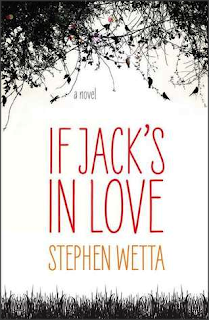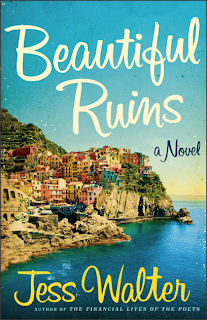Disclaimers
- Not all of these books were published in 2012; they are just the books I read during 2012.
- I wrote reviews for some these books after coming back from a review hiatus. Whenever there’s a review, I include the link. Whenever there’s not, I don’t.
- I had a goal of reading 40 books this year. I ended up nowhere close. Oh well.
- If you have read any of these and loved them, tell me! If you have read any of them and hated them, tell me that, too! Really. If you have any that you think are must-reads for next year, pony up! Quit being all secretive and everything. Geesh.
And here goes!
The Best Book You Aren’t Reading Because You Don’t Read YA (or Know What YA Is): If Jack’s In Love by Stephen Wetta
A new spin on the boy-meets-girl storyline, this coming-of-age story will have you falling for sweet, flawed and insightful Jack Witcher. And don’t let the YA label (or my overuse of hyphens) deter you. The Book Babes (my book club) loved it and we are all of a “certain age” that’s probably not THAT age, but not teen, tween or even somewhere in between. My review is here.
The Best Book on Sticking By Your Brothers on the Battlefield, the Playing Field and Field of Movie Making: Billy Lynn’s Long Halftime Walk by Ben Fountain
“Billy felt his stride going wonky, his arms starting to flail, but a quick glance at Dime settled him down. Shoulders square, eyes forward, head tipped six degrees as if dignity was a shot glass you balanced on your chin… Fake it till you make it, he reminds himself. This is how he’s survived Army life so far.”
It’s that kind of writing that secured a National Book Award nomination for Fountain and a spot on my Best of 2012 (okay, yes and on many other more notable lists. Minor details.)
My review is here.
The Best Book on Race, Class and What it Means to be a Family: Run by Ann Patchett
You should also read
Run because I met Ann Patchett this year and she’s a rock star. All her stuff is good; I shouldn’t even have to tell you that. But if you are one of those people that need details about a book before you read it, then fine.
Check out my review of Run.
The Best Contemporary Love Story by a Female Writer That is Not Chick Lit: Love Slave by Jennifer Spiegel
Sybil Weatherfield is a writer. She’s a temp. She’s in a bad relationship with a good guy. She’s in a good relationship with a bad boy. She’s a wreck. But she’s endearing and funny.
“I get wind of free food at work. Actually, let me be frank: I keep a lookout for it—my ears are open; they’re burning. I’m not looking to gossip by the water cooler. I don’t care about the nitty-gritty details of the lives of these people—I am a temp. Here today, gone tomorrow. I just want to know who has the chicken wings, who brought in the cinnamon buns with the sugar-glaze frosting shit.”
The Book You Will Incorrectly Judge By Its Cover and Love Even More than You Thought You Would: Beautiful Ruins by Jess Walter
A dust jacket with a frothy beach at the base of cliff-side dwellings, swirly text and a name like Jess Walter screams summer chick lit at its best! But Jess is a guy and BEAUTIFUL RUINS is a smartly told love story that’s low on sap and high on engaging story telling with the right amount of wit. Plus, I met Jess Walter and he’s super fabulous and now I want to read everything he’s ever written. You should too.
My review of Beautiful Ruins is here.
The Best Celebrity Memoir About Hitting Rock Bottom and Surviving That You Think You Have Already Read but You Really Haven’t: Guts by Kristen Johnston.
I always want to call her Kirsten and say she was on 30 Rock. Truth is, it’s Kristen and she’s most known for her role as alien Sally on 3rd Rock from the Sun. So, I’m kinda close. But let’s talk about her book, Guts. Super candid. Super funny. Super scary. All-around super duper. Seriously. I am going to have the kiddo read GUTS as part of his education about the horrors of substance abuse. But in a couple of years—not now. (Don’t want the grandparentals freaking out or anything).
The Most Creative Way to Write About a Relationship: The Lover’s Dictionary By David Levithan
I read this in two thirty-minute sittings last week. Ate. It. Up. I did. I am going to write a review, but I am still taking it all in. So for now, I will tell you that author Levithan chronicles the meet and greet, courtship, comfortable, too comfortable, and then uncomfortable world of a couple through short bursts of dictionary entries. Some are witty. Some will slay you. Some may hit really close to home. All are pitch perfect.
autonomy, n. “I want my books to have their own shelves,” you said, and that’s how I knew it would be okay to live together.
dispel, v. “It was the way you said, “I have something to tell you.” I could feel the magic drain from the room.”
placid, adj. “Sometimes I love it when we just lie on our backs, gaze off, stay still.”
The Best Book of Short Stories Written by Someone I Know: The Freak Chronicles by Jennifer Spiegel
Yes, she also wrote Love Slave and already appeared on my list. And who cares if The Freak Chronicles was the only book of short stories I read this year? She’s good. So good, that two of the stories are nominated for Pushcart Prizes. Don’t know what that is? I don’t really either, but it’s like an Emmy or an Oscar and it’s just a pleasure to be nominated. So read this now and you can say you read her before she got all famous and everything.
The Best Book You Feel Terribly Horrible and Sad Saying is Utterly Fascinating (in a Terribly Horrible and Sad Way): Columbine by Dave Cullen
10 years after Columbine, one of the original reporters released the book that debunks a number of original errors about the killers, the victims and the whole awful tragedy. It’s not easy reading. But, it’s fascinating and important reading. And I would recommend reading it with others and having a dialogue. The Book Babes talked about this one for hours.
Best Book by An Author I Have A Crazy, Stupid, Crush On: The Fault in Our Stars by John Green
A star of YA fiction, John Green has written a great book on young love in the midst of a cancer diagnosis. Total downer, right? Wrong. A little precocious at times or maybe I’m just out of touch with how smart and insightful 16 year-old kids can be… but it really is a gem amidst all the vampire teen fiction and one that I really enjoyed. Plus, John’s a total cutie and major book nerd. SWOON!
The Best Literary Romance, Coming of Age Tale Starring a Bad Boy With the Name of Grey: The Rules of Civility by Amor Towles
Gotcha! No BD-SM, repressed soccer mommy porn here. (The word “literary” was the giveaway). I am talking about Tinker Grey, the mysterious and handsome stranger that captures the fancy of Katey Kontent, but the heart of Eve Ross. And the writing is fantastic.
“She had changed into high heels and a tangerine-colored blouse that clashed with all her best intentions”
Set primarily in 1930s New York, The Rules of Civility takes us on a journey of three souls trying in earnest to live their most authentic lives.
The Best Inappropriate Book (and by ‘inappropriate’ I mean hilarious and you’re welcome): Let’s Pretend this Never Happened: A Mostly True Memoir by Jenny Lawson
“I’d just run into my gynecologist at Starbucks and she totally looked right past me like she didn’t even know me. And so I stood there wondering whether that’s something she does on purpose to make her clients feel less uncomfortable, or whether she just genuinely didn’t recognize me without my vagina… I don’t mean “without my vagina” like I didn’t have it with me at the time. I just meant that I wasn’t, you know… displaying while I was at Starbucks.”
See what I mean?
The Best Reality Check and the Only Award Winner I Read this Year: Salvage the Bones by Jesmyn Ward
Remember Hurricane Katrina? Of course you do. Remember so many people saying, “Why didn’t those people just leave?” Yep, that too. And many of those people questioning everything were people with means. Now meet the Batiste family. A poor, motherless family with no option but to stay in harm’s way, preparing for the worst and praying for the best. My review of Salvage the Bones.
Whoops! I read a Pulitzer, too: The Best Pulitzer Prize for Fiction and One of the Few Books I’ve Ever Read Twice: A Visit from the Goon Squad by Jennifer Egan
I read this first in 2011 on my own (
and reviewed it here). Then it won the Pulitzer and the Book Babes selected it this year, so I read it again. Now, I am not typically a fan of the Pulitzer picks. It’s really out there or boring, or I am out there and boring, or I just don’t know. But here’s a Pulitzer that I get. It’s creative and different and good. Good enough I read it again.
Everything Else I Read This Year That Wasn’t As Good or I Just Couldn’t Come Up With a Snappy Headline, So You Will Have to Look Them Up Decide For Yourself–Or Just Ignore Them… I Don’t Mind)
Something Borrowed: Emily Giffin
Dash and Lily’s Book of Dares: Rachel Cohn and David Levithan
Lit: Mary Karr
The Inn at Lake Divine: Elinor Lippman
Songs for a Teenage Nomad: Kim Culbertson
Open City: Teju Cole
Fifty Shades of Grey: EL James (You know I couldda come up with a headline for this one, but it really wasn’t good. At. All. Not even a little bit.)

 “You can choose your friends but you sho’ can’t choose your family, an’ they’re still kin to you no matter whether you acknowledge ’em or not.” ~ Harper Lee To Kill a Mockingbird
“You can choose your friends but you sho’ can’t choose your family, an’ they’re still kin to you no matter whether you acknowledge ’em or not.” ~ Harper Lee To Kill a Mockingbird



